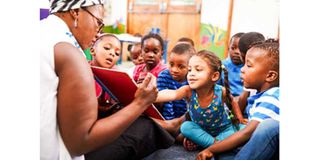Give children a voice on matters sexual violence

A teacher with her pupils.
What you need to know:
- My article, titled ‘Why women need to openly talk about sex’, elicited such strong reactions from readers.
- While some readers agreed with my sentiments, some were vehemently opposed to them.
I know sex is a taboo topic in many conservative societies, but I never imagined that my article, titled ‘Why women need to openly talk about sex’, would elicit such strong reactions from readers.
While some readers agreed with my sentiments, some were vehemently opposed to them. And I consider that part and parcel of the job; not everyone has to agree with a columnist. It still baffles me, though, about how little the things I pontificate about, like justice, open-mindedness, and tolerance, have advanced in my three years of column-writing.
I don’t write to change the world, but at the very least, I hope to flip a few perspectives. One perspective that I would consider myself successful if I flipped, was to lift off shame from conversations to do with sex and sexual violence.
Conversation
My daughter’s former school was open to such conversations. And while I would have preferred the exact biological terms to the use of the word “private parts”, I still applauded their willingness to teach children about them, and to compose a song to remind them that nobody should touch them.
“These are my private parts, and nobody should touch them,” they sung, while touching the said private parts for emphasis. The teachers taught us the song as well during orientation. The aim, the teachers said, was to sensitise the pupils to sexual violence in the early stages of their lives.
A genius move, if you ask me, given how vulnerable boys and girls are to sexual violence right from the family level. There have been too many cases of nannies preying on little boys, of fathers preying on little girls, and doing all kinds of despicable things that children should never be exposed to.
This is also personal to me, as I was six years old when our class teacher touched me inappropriately many times. I did not have the language to report him to anybody, not even my mother, for teachers were demigods back then.
I never understood why he behaved this way until I was an adult and understood that sexual violence is about power. He had the power, and I didn’t.
I have often wondered about how differently my childhood would have turned out had I been empowered to speak out against such vile acts. Would I have been as compliant or as tolerant of the class teacher’s behaviour?
These thoughts cross my mind every time I hear about a case of violence against women and girls, as they are the ones who are overwhelmingly affected by gender-based violence (GBV).
If we catch them early, as early as nursery and primary school, perhaps women and girls would be less tolerant of touches, slaps, sexist and disparaging remarks, online violence, verbal, and emotional abuse that are often the ugly beginning of GBV.
What if we taught children to recognise sexism and sexual violence when it happened, and equipped them with the language to voice their thoughts against it?
This could easily be part of the curriculum, but that is a different debate altogether, given the opposition that proponents of sex education encountered for suggesting its implementation in schools.
As we mark 16 Days of Activism against GBV, running from November 25 to December 10, let’s consider ensuring that children have a voice, too. Ending violence against women and girls will take a whole generation’s effort. And our safest bet is to start with our little ones.
Miss Oneya comments on gender and social topics. Twitter: @FaithOneya, email: [email protected]





